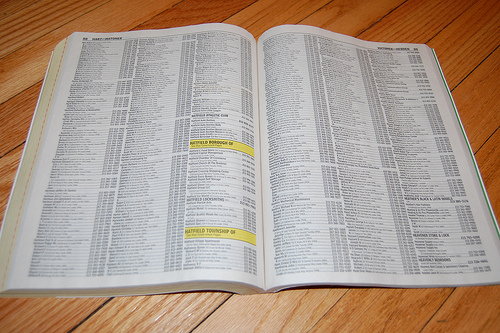Ending Washington’s regime of mandatory white pages delivery is common sense. Sightline, Seattle Public Utilities, Dex, CenturyLink, and many other telecom entities in the state support the idea. The state attorney general opposes it for two apparent reasons. The AG argues, first, that optional delivery of white pages would be a threat to public safety—a silly argument we have addressed previously—and, second, that optional white pages would prevent equal access to telecommunications.
Let’s take up that second argument—the equity dimension of white pages delivery. Is it fair to make delivery of the white pages optional?
Certainly, revisions to the white pages law should protect the public interest, and that probably means providing access to print directories for those on the analog side of the digital divide. It’s easy for everyday web users to forget that access to the Internet is not equal. According to the FCC, access rates are lower than average for black and Latino households. Rural residents, older people, and low-income households are also less likely to have high-quality access to the web.
Fortunately, it’s easy to ensure that anyone who wants a phone book can still get a free copy, using either an “opt-out” or “opt-in” system.
With an “opt-out” system, customers must contact the phone company in order to decline delivery of the phone book. Otherwise, the directories are automatically delivered. By contrast, with an “opt-in” system, customers are spared copies unless they request one.
An opt-in system means that only people who want printed phone directories get one, keeping hundreds of thousands of unwanted copies off our collective doorsteps. It’s the best system for reducing waste and costs, while still preserving fair access to the telecommunications system. In fact, at least 18 states plus DC already allow opt-in systems, and these states are demonstrating that providing directories to people who want them is straightforward.
Phone companies are, after all, pretty good at contacting their customers when they need to, and state regulators only need to make sure that they do so to ensure that everyone has the ability to obtain a phone book. In other states, telecoms have been required to notify customers of their opt-in rights in a variety of ways. For example, Alabama phone companies have to include a notice on the cover and as a bound insert in yellow pages or business directories, and they must publish press releases. Many of these same requirements are in force in other states such as California, which also mandates monthly notices in customers’ billing statements. Ohio ensures that emails and texts go to customers who also have wireless phone or Internet service.
Washington regulators could require several of the following steps to ensure access:
- Phone companies should send customers a letter with a simple, clearly-worded, postage-paid postcard they can return (“Yes, please send me the new white pages!”).
- Monthly bills should include a check box on the payment slip, or a piece of paper that gets mailed in with the monthly payment.
- Monthly bills should also include a big, red-letter notice saying, “Dial 1-800…. for a free phone book.” (Or telecoms could even be required to robo-call some of their customers: “Press 1 if you want the new white pages”).
Anyone who can use a phone book—who can navigate the tiny print to look up a number and make a phone call—should be able to manage any of these steps, especially if the notices are published in multiple languages. Community centers, libraries, post offices, and care facilities would keep copies on hand too. In short, it’s eminently possible to preserve access to telephone directories without incurring pointless costs, waste, and annoyance.
Available statistics strongly suggest that mandatory universal phone book delivery is a relic. One industry-funded study found that 87 percent of US adults support an opt-in system. That figure was borne out by New York State regulators who cited a Verizon study of its customers showing that only 11 percent used the white pages in 2008, and that usage rates were in sharp decline. (It is worth noting, however, that a 2010 study by the Local Search Association, apparently found that 63 percent of US consumers had used the printed white pages at least once in the past year.)
In reality, it appears that very few customers are actually interested in receiving white pages directories. In the states that already allow optional delivery:
- In New York State, where Verizon has roughly 4.7 million lines in service, it reportedly received requests for white pages from customers owning fewer than 2 percent of those lines.
- In Alabama, where the state rolled out a two-year pilot program in the Mobile metro area, officials discovered that only 6 percent of residents wanted a phone book delivered the first year, and 7 percent the second year.
- In Atlanta and Austin, AT&T says that fewer than 3 percent of customers request directories.
- Nationwide, AT&T has indicated that just 1 or 2 percent of its customers want print white pages directories in places where delivery is optional.
Based on the very low level of interest shown by phone customers in other states, Washington regulators should establish an “opt-in” system for white pages deliveries.
To ensure equitable access to telephone listings, the UTC should require several methods of customer notification, including return postcards, billing statement check-boxes, “dial 1-800…” notices, and perhaps even targeted robo-calls. The result would be equal access to the telecommunications system, but with far less waste than business-as-usual, which currently results in state-mandated deliveries of big bricks of unwanted paper to everybody, year after year.


Comments are closed.